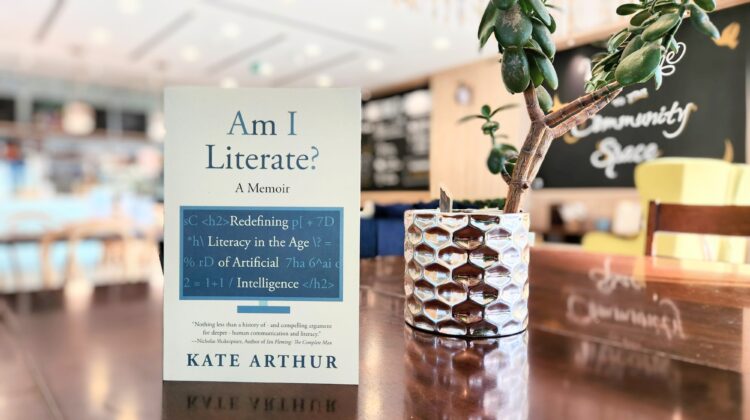

🔬 Book Review by Michelle Baldwin.
Michelle is a Senior Associate at Equity Cubed, an advisor to the Montreal AI Ethics Institute, and a faculty member in the Governance, Leadership, and Ethics program at Huron University.
Reviewed by Michelle Baldwin through the lens of community, social capital and inclusive innovation
Introduction
In Am I Literate? Redefining Literacy in the Age of Artificial Intelligence, Kate Arthur issues a bold and necessary call to redefine what it means to be literate in a world that is being shaped by artificial intelligence. As someone who believes that the future of AI must be shaped by all citizens and sectors, not the other way around, this book powerfully echoes a calling I have been carrying and a message I have been working to bridge across social impact organizations and communities.
Kate’s book models relational practice and humanity through her storytelling, as it is about more than AI and emerging technology. It is a personal and visionary invitation to view literacy not only as functional skills but as the foundation of participatory agency in this digital age. She situates this redefinition within the ecosystems of community, social infrastructure and ethical innovation that prioritizes people and the planet.
Literacy as Community Power
Kate begins with the premise that literacy is more than the ability to read and write; it is about how we connect, create and influence the world around us. She threads personal narrative and inter-generational storytelling into her exploration of literacy, grounding her work in lived experience and ancestral knowledge. She aligns with traditions of community-based knowledge and relational learning. Her interpretation of community is especially compelling: not a buzzword, but a “thread that weaves individuals together to be part of something larger; something transformative” (p. 162).
This definition resonates deeply in an era where social capital, networks of trust, mutual aid and shared learning are essential to both individual resilience and collective innovation. By connecting computing literacy to community, she emphasizes that understanding AI is not just a technical task but a civic and human responsibility.
AI Literacy as Social Infrastructure
Kate repeatedly highlights the importance of building AI literacy as a form of social infrastructure. On page 183, she highlights the role of governments in catalyzing multi-stakeholder ecosystems, suggesting that AI must be approached collaboratively across sectors and disciplines. Her call for neutral conveners and public-interest governance links literacy with democracy, equity, and access. This deeply resonates with my belief that Canada’s AI strategy must be shaped through a cross-sector approach that includes nonprofits, philanthropy, social enterprise, and underrepresented communities at the table.
Her reflections, including her first connection with Abhishek Gupta, co-founder of Montreal AI Ethics Institute, alongside Renjie Butalid, and about the profound loss of Abhishek as an AI pioneer and champion, remind us that technology is always rooted in human relationships. Abhishek was an advocate for AI education and literacy, and he stood in solidarity with others, including Kate, amplifying her message and so many others.
A Planetary Ethic
One of the book’s most important contributions is its explicit call to link technological literacy and planetary wellbeing. Kate writes, “Equipping individuals with literacy skills to engage responsibly with AI systems is essential not just for the benefit of humanity but also for the well-being of the planet” (p. 188). This reframing challenges the dominant narratives of innovation for growth and profit at all costs and positions literacy as a tool for both ecological and social regeneration.
A Personal Note
Reading Kate’s book felt like sitting down for a good cup of coffee with her, having her share personal stories and reflections that are deeply honest, thoughtful, and full of heart. As I read her book, I found myself not only reflecting on the content but on my own journey. At a moment of personal transition, this book served as a powerful nudge to think expansively and not shy away from spaces that initially feel unfamiliar or beyond my strengths. Situating myself in the AI space has often been met with resistance from others and, at times, doubt in my own technical capacities. But through her stories and insights, I have found a renewed sense of purpose: reimagining capital and technology for community-led futures. Her book helped me sharpen that focus with clarity and courage and reminded me that I am capable of learning both the social implications and the technical dimensions of this work.
Final Reflections
Am I Literate? is more than a guidebook for digital skills; it is a roadmap for redefining the purpose of education, innovation and civic life in an AI-enabled era. For philanthropists, educators, policymakers, and grassroots organizers, Kate’s writing provides a powerful framework for centering people and planet within technological advancement. The book highlights the transformative power of literacy in building resilient communities and promoting inclusive innovation. In a time when literacy may determine who shapes the future and who is left behind, Kate urges us to act not just as consumers of information or users of AI, but as collaborative stewards of a shared, inclusive and regenerative future. I am with you, Kate and this vision, and for those feeling compelled to dive into this powerful work, you can learn more and get her book at karthurmedia.com.
